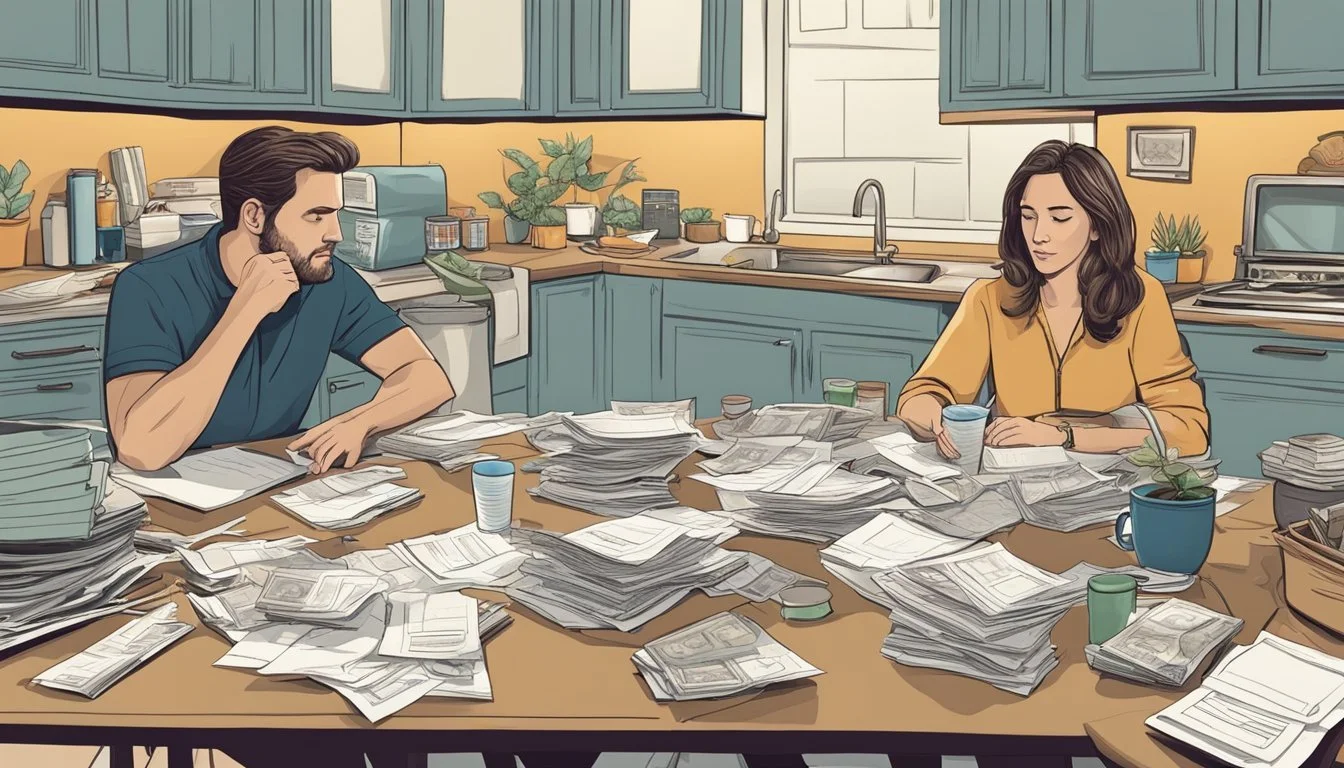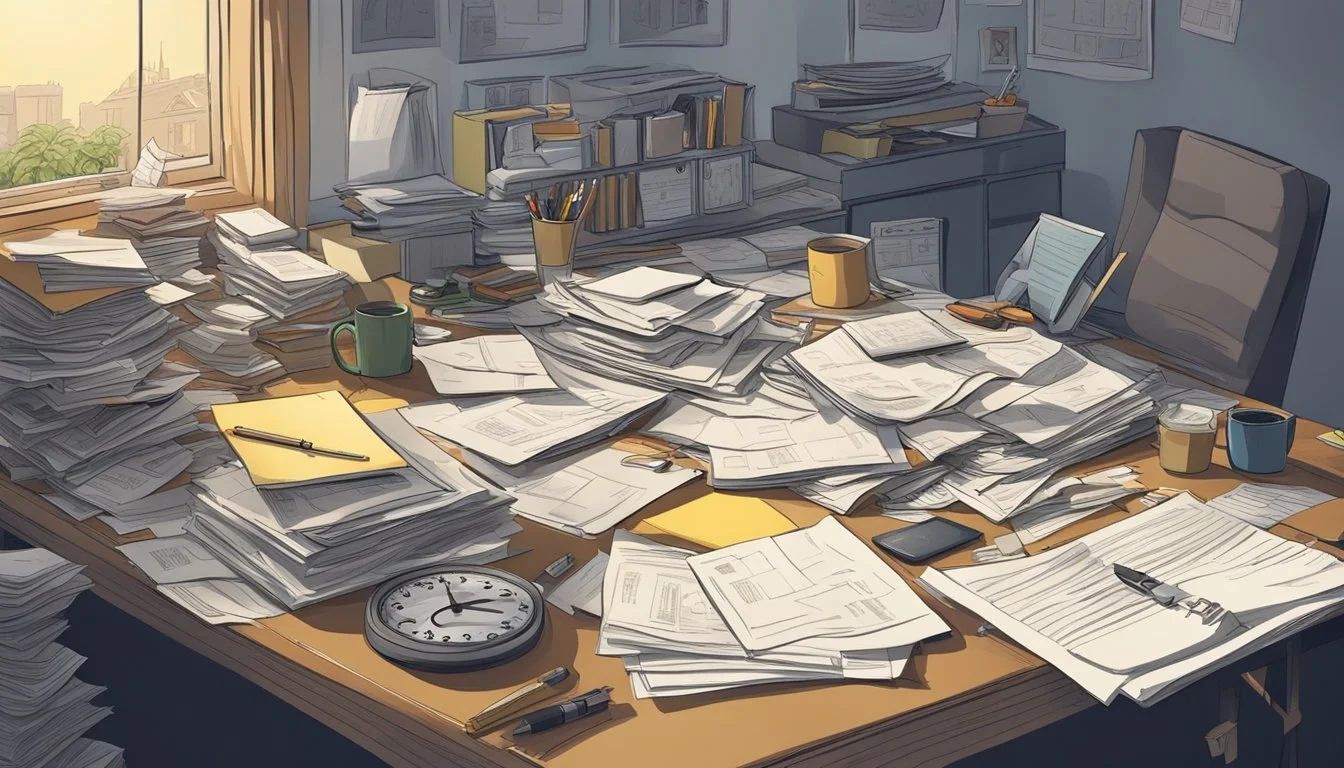14 Unexpected Triggers of Emotional Exhaustion in Relationships
Hidden Stressors That Strain Couples
Relationships are complex emotional landscapes that can profoundly impact our well-being. While love and connection bring joy, certain aspects of partnerships can unexpectedly drain our emotional reserves. Recognizing these hidden triggers of emotional exhaustion is crucial for maintaining healthy, balanced relationships.
Many individuals focus on obvious stressors in their romantic partnerships, but subtle factors often go unnoticed. These lesser-known triggers can gradually erode emotional energy, leading to burnout and strain on the relationship. Identifying and addressing these unexpected sources of emotional fatigue can help couples strengthen their bond and improve overall relationship satisfaction.
1) Micro-managing by your partner
Micro-managing in relationships can be a significant source of emotional exhaustion. When a partner constantly scrutinizes and tries to control every aspect of their significant other's life, it creates an atmosphere of tension and mistrust.
This behavior often stems from underlying insecurities or a need for control. The micro-managing partner may believe they are helping, but their actions can leave the other person feeling suffocated and incompetent.
Constant questioning about daily activities, critiquing personal choices, and attempting to dictate how tasks should be done are common manifestations of micro-management in relationships. These actions can erode self-esteem and independence over time.
The emotional toll of being micro-managed can lead to feelings of resentment, frustration, and inadequacy. The recipient may start to doubt their own abilities and decision-making skills, further exacerbating the cycle of emotional exhaustion.
To address this issue, open communication is crucial. Both partners need to recognize the impact of micro-managing behaviors and work together to establish trust and respect for each other's autonomy.
2) Lack of emotional support
Emotional support plays a crucial role in maintaining healthy relationships. When partners fail to provide this support, it can lead to emotional exhaustion.
Lack of emotional support manifests in various ways. A partner may dismiss or minimize the other's feelings, refusing to listen or offer comfort during difficult times.
They might also fail to celebrate achievements or share in moments of joy. This absence of empathy and understanding can leave one feeling isolated and unappreciated.
Consistently seeking emotional validation from outside the relationship often indicates a lack of support within it. This can drain energy and create feelings of loneliness even when together.
Partners who struggle to express their own emotions may inadvertently withhold support. Their inability to connect on an emotional level can leave the other person feeling unfulfilled.
Over time, this emotional neglect can erode trust and intimacy. It may lead to resentment, anxiety, and a sense of emotional depletion within the relationship.
Addressing this issue requires open communication and a willingness to learn and grow together. Both partners must actively work on providing and receiving emotional support to maintain a healthy connection.
3) Over-commitment to social activities
Social engagements can be a source of joy and connection, but excessive commitments may lead to emotional exhaustion in relationships. Couples who constantly attend events, parties, and gatherings may find themselves spread thin.
The pressure to maintain an active social life can create stress and fatigue. Partners may feel obligated to participate in numerous activities, even when they desire quiet time together or alone.
This constant socializing can leave little energy for nurturing the relationship itself. Quality time between partners may become scarce, impacting emotional intimacy and communication.
Over-scheduling can also lead to neglect of personal needs and self-care. Individuals may struggle to find time for relaxation, hobbies, or pursuing individual interests.
The guilt associated with wanting to decline invitations can add to emotional strain. Partners may feel torn between social obligations and their desire for downtime.
Financial stress can also arise from frequent social commitments. Dining out, buying gifts, or participating in costly activities can strain budgets and create additional tension.
4) Financial instability and disagreements
Financial troubles can strain even the strongest relationships. Money worries create stress and anxiety that often spill over into other areas of a couple's life together.
Disagreements about spending habits, saving strategies, or debt management can lead to frequent arguments. These conflicts may erode trust and intimacy between partners over time.
Chronic financial instability can make individuals feel insecure and powerless. This emotional burden may cause them to lash out at their partner or withdraw from the relationship entirely.
Differing financial values or goals between partners can create ongoing tension. One person may prioritize saving while the other prefers to spend, leading to resentment on both sides.
Job loss or income reduction can dramatically alter a couple's lifestyle and future plans. Adjusting to these changes often proves emotionally draining for both individuals.
Financial secrets or dishonesty about money matters can severely damage trust. Discovering hidden debts or accounts may leave partners feeling betrayed and questioning the relationship's foundation.
5) Excessive online communication
Constant digital interaction can lead to emotional exhaustion in relationships. Many couples rely heavily on texting, social media, and messaging apps to stay connected throughout the day.
This constant stream of communication can create pressure to respond immediately and be available 24/7. Partners may feel overwhelmed by the expectation of constant contact and updates.
The lack of face-to-face interaction can also contribute to misunderstandings and miscommunication. Nuances in tone and body language are lost in text-based exchanges, potentially leading to conflicts.
Excessive online communication can blur boundaries between personal and shared time. Partners may struggle to maintain individual space and independence when always digitally tethered.
The compulsion to share every moment online can detract from genuine experiences. Couples may find themselves more focused on documenting their relationship for social media than enjoying quality time together.
Balancing digital connection with in-person interaction is crucial for maintaining emotional well-being in relationships. Setting boundaries around online communication can help prevent burnout and foster deeper connections.
6) Emotional unavailability
Emotional unavailability can be a significant trigger for emotional exhaustion in relationships. Partners who struggle to connect emotionally often leave their significant others feeling drained and unfulfilled.
Signs of emotional unavailability include difficulty expressing feelings, avoiding deep conversations, and maintaining a distant demeanor. These behaviors can create a sense of loneliness and frustration for the other person in the relationship.
Emotionally unavailable individuals may struggle with vulnerability and intimacy. They might withdraw when faced with emotional situations or conflicts, leaving their partners feeling unsupported and disconnected.
This pattern can lead to a cycle of pursuit and withdrawal, where one partner constantly seeks emotional connection while the other retreats. Over time, this dynamic can become emotionally exhausting for both individuals.
Addressing emotional unavailability requires self-awareness and a willingness to work on communication skills. Couples may benefit from therapy or counseling to develop healthier emotional patterns and improve their ability to connect with each other.
7) Chronic forgetfulness of important dates
Forgetting significant dates in a relationship can lead to emotional exhaustion for both partners. Birthdays, anniversaries, and other milestones hold sentimental value and symbolize commitment.
When one partner consistently fails to remember these occasions, it can make the other feel unimportant or taken for granted. This repeated disappointment may cause frustration, hurt feelings, and a sense of emotional depletion over time.
The partner who forgets may experience guilt and anxiety, constantly worrying about missing important dates. This ongoing stress can contribute to their own emotional fatigue.
Chronic forgetfulness may also erode trust and create doubts about the relationship's priority in one's life. The emotional labor of reminding a partner about significant dates can become draining for the other person.
Over time, this pattern may lead to decreased relationship satisfaction and increased emotional exhaustion for both individuals. It can create a cycle of disappointment, resentment, and emotional distance between partners.
Addressing this issue requires open communication, understanding, and finding practical solutions to remember important dates. This can help alleviate the emotional toll on both partners and strengthen the relationship.
8) Excessive jealousy or possessiveness
Excessive jealousy and possessiveness can be significant triggers of emotional exhaustion in relationships. These behaviors often stem from deep-seated insecurities and fears of abandonment.
Partners experiencing pathological jealousy may constantly suspect infidelity, even without evidence. They might obsessively monitor their partner's activities, communications, and social interactions.
Possessive behavior can manifest as attempts to control a partner's friendships, career choices, or personal interests. This level of control can leave the recipient feeling suffocated and drained.
The constant need to reassure a jealous partner can be emotionally taxing. It may lead to withdrawal from social situations or self-censorship to avoid triggering jealous reactions.
Over time, excessive jealousy and possessiveness erode trust and intimacy in a relationship. The accused partner may experience frustration, resentment, and a loss of personal autonomy.
Addressing these issues often requires professional help. Therapy can assist in identifying the root causes of jealousy and developing healthier coping mechanisms.
9) Neglecting self-care routines
In the pursuit of maintaining relationships, many individuals inadvertently neglect their own self-care routines. This oversight can lead to emotional exhaustion and strain within partnerships.
Self-care encompasses various activities that promote physical, mental, and emotional well-being. These may include regular exercise, adequate sleep, healthy eating habits, and engaging in hobbies or relaxation techniques.
When partners consistently prioritize the needs of their relationship or their significant other over their own, they risk depleting their emotional reserves. This can result in feelings of burnout, irritability, and decreased capacity to handle stress.
Neglecting self-care can also impact one's ability to be fully present and engaged in the relationship. It may lead to resentment, as individuals feel they are sacrificing their own needs for the sake of their partner or the relationship.
To maintain a healthy balance, partners should encourage each other to engage in self-care activities. This mutual support can strengthen the relationship while ensuring both individuals have the emotional resources to navigate challenges together.
10) Disrespecting personal boundaries
Personal boundaries are essential for maintaining healthy relationships. When these boundaries are disregarded, it can lead to emotional exhaustion for the person whose limits are being violated.
Boundary violations can take many forms. A partner might repeatedly ignore requests for alone time or personal space. They may share private information without permission or make decisions that affect both parties without consultation.
Some individuals may constantly pry into their partner's personal affairs, demanding access to their phone or social media accounts. This behavior erodes trust and creates a sense of being under constant surveillance.
Physical boundaries are equally important. Unwanted touch or pressure for physical intimacy when one partner has expressed discomfort can be emotionally draining.
Disrespecting boundaries often stems from a lack of understanding or a desire for control. The person violating the boundaries may not realize the impact of their actions on their partner's emotional well-being.
Addressing boundary issues requires clear communication and mutual respect. Both partners need to express their needs and limits openly, and then honor those boundaries consistently.
11) Imbalance in household responsibilities
Unequal distribution of household tasks can lead to emotional exhaustion in relationships. When one partner consistently shoulders more of the domestic burden, resentment often builds.
This imbalance may stem from societal expectations, ingrained habits, or differing standards of cleanliness. The overworked partner may feel undervalued and taken for granted.
Constant cleaning, cooking, and organizing can drain energy and leave little time for self-care or leisure activities. The physical and mental toll of managing a household alone can be overwhelming.
Communication breakdowns often occur when discussing chore division. Frustration mounts as requests for help go unheeded or are met with resistance.
Over time, the imbalance can erode trust and intimacy in the relationship. The exhausted partner may withdraw emotionally, feeling unsupported and unappreciated.
Addressing this trigger requires open dialogue, compromise, and a willingness to adjust long-standing patterns. Both partners must actively work to create a more equitable distribution of household labor.
12) Lack of mutual friends
Shared social connections play a crucial role in relationship dynamics. When couples lack mutual friends, it can lead to unexpected emotional strain and exhaustion.
Having separate social circles can create a sense of disconnection between partners. They may struggle to find common ground or shared experiences outside their relationship.
Without mutual friends, couples miss out on opportunities for joint social activities. This can result in feelings of isolation or loneliness within the relationship.
Maintaining separate friend groups may also lead to time management issues. Partners might feel torn between spending time with each other and their individual social circles.
The absence of mutual friends can limit external support systems for the relationship. Shared friends often provide a neutral perspective and can help mediate conflicts.
Couples without common social connections may find it challenging to integrate their lives fully. This can create a sense of living parallel lives rather than a shared existence.
Over time, the lack of mutual friends can contribute to emotional exhaustion as partners navigate these social challenges alone.
13) Addiction to social media
Social media addiction can significantly impact relationships, leading to emotional exhaustion. Excessive use of platforms like Facebook, Instagram, and Twitter can create a disconnect between partners.
Constantly checking notifications and scrolling through feeds takes time away from meaningful interactions. This behavior can leave one partner feeling neglected or unimportant.
The need for likes, comments, and shares can become all-consuming. Individuals may prioritize their online presence over real-life connections, straining their relationships.
Comparing one's relationship to idealized versions presented on social media can breed dissatisfaction. This unrealistic comparison can lead to feelings of inadequacy and resentment.
The constant influx of information and stimuli from social media can be overwhelming. This digital overload can leave individuals mentally drained, with little energy left for their partner.
Addiction to social media can also fuel jealousy and trust issues. Seeing a partner interacting with others online may trigger insecurities and arguments.
Breaking the cycle of social media addiction requires conscious effort. Setting boundaries, having designated device-free times, and focusing on quality time together can help restore balance in relationships.
14) Constant criticism
Constant criticism can be a significant source of emotional exhaustion in relationships. Partners who frequently find fault with each other create an atmosphere of negativity and tension.
This persistent negativity can erode self-esteem and confidence over time. The criticized person may feel they can never meet their partner's expectations, leading to frustration and hopelessness.
Constant criticism often stems from unmet needs or unresolved issues within the relationship. It can be a harmful substitute for effective communication and problem-solving.
The impact of constant criticism extends beyond the immediate moment. It can create a cycle of defensiveness and withdrawal, damaging the emotional connection between partners.
Recognizing and addressing this pattern is crucial for relationship health. Partners need to learn to express concerns constructively and focus on positive reinforcement.
Developing empathy and understanding can help reduce critical behavior. Couples may benefit from practicing active listening and validating each other's feelings and experiences.
Understanding Emotional Exhaustion
Emotional exhaustion can significantly impact relationships and personal well-being. It develops gradually from prolonged stress and overwhelm, leading to feelings of depletion and burnout.
Definition and Symptoms
Emotional exhaustion refers to a state of feeling emotionally drained and depleted. Common symptoms include:
Persistent fatigue
Difficulty concentrating
Increased irritability
Feelings of hopelessness
Physical symptoms may also manifest, such as headaches, changes in appetite, and sleep disturbances. People experiencing emotional exhaustion often feel unable to cope with daily stressors and may withdraw from social interactions.
Common Causes
Several factors can contribute to emotional exhaustion in relationships:
Chronic conflict or tension
Lack of emotional support
Unmet expectations
Caregiver burnout
Work-life imbalance
High-stress jobs, financial pressures, and major life changes can exacerbate emotional exhaustion. Individuals with perfectionist tendencies or those who struggle to set boundaries are more susceptible.
Unresolved relationship issues, such as poor communication or lack of intimacy, can create a cycle of emotional drain. External stressors like family obligations or health problems may further compound the issue.
Psychological Triggers in Relationships
Psychological triggers can profoundly impact relationship dynamics. These triggers often stem from past experiences and unmet needs, shaping how partners interact and respond to each other.
Unresolved Trauma
Unresolved trauma can significantly influence relationship behaviors. Traumatic experiences from childhood or past relationships may resurface, causing intense emotional reactions. A partner's actions or words might unintentionally trigger painful memories.
Common trauma triggers include:
Raised voices or arguments
Unexpected physical touch
Feelings of abandonment or rejection
Individuals with unresolved trauma may exhibit:
Heightened anxiety in social situations
Difficulty trusting their partner
Emotional withdrawal or sudden outbursts
Addressing trauma requires patience and professional help. Open communication and understanding between partners are crucial for healing.
High Expectations
Unrealistic expectations can create significant stress in relationships. Partners may set impossibly high standards for themselves or each other, leading to constant disappointment.
Examples of high expectations include:
Expecting a partner to fulfill all emotional needs
Demanding perfection in appearance or behavior
Anticipating mind-reading abilities
These expectations often result in:
Frequent arguments over unmet standards
Feelings of inadequacy or resentment
Diminished satisfaction in the relationship
To manage high expectations, partners should:
Communicate openly about their needs and limitations
Practice self-awareness and realistic goal-setting
Celebrate small successes and efforts made by each other
The Role of Communication
Communication forms the foundation of emotional connection and understanding in relationships. It shapes how partners express needs, resolve conflicts, and support each other through challenging times.
Miscommunication Issues
Misunderstandings often arise from unclear or inconsistent messaging between partners. When one person assumes the other can read their mind, it leads to unmet expectations and frustration. Indirect communication or hinting instead of speaking directly can create confusion.
Defensive responses or interrupting before the other finishes speaking interfere with productive dialogue. Differences in communication styles, such as one partner being more talkative while the other is reserved, can create imbalances.
Nonverbal cues like tone of voice, facial expressions, and body language play a crucial role. Misinterpreting these signals frequently leads to hurt feelings or arguments based on false assumptions.
Lack of Empathy
Empathy allows partners to understand each other's perspectives and emotions. Without it, communication becomes cold and disconnected. A lack of empathy manifests as dismissing or minimizing the other's feelings.
Failing to actively listen and validate a partner's experiences erodes emotional intimacy. Judgment or criticism instead of compassion pushes couples apart. Self-centeredness prevents seeing situations from the other's point of view.
Empathetic communication involves asking questions to understand deeper meanings and motivations. It requires patience to sit with a partner's difficult emotions without trying to "fix" them immediately.
Developing empathy skills takes practice but greatly enhances relationship satisfaction. Partners who feel truly heard and understood are more likely to open up and work through challenges together.















